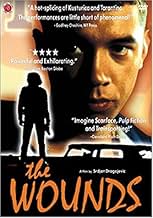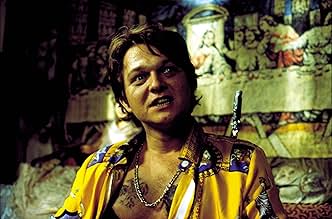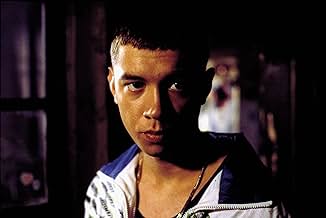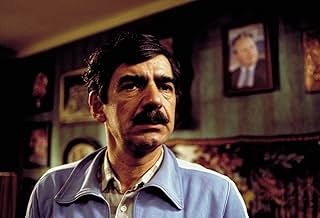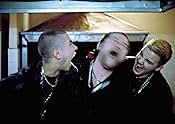Rane
- 1998
- 1 h 43 min
AVALIAÇÃO DA IMDb
8,0/10
12 mil
SUA AVALIAÇÃO
Adicionar um enredo no seu idiomaThis film follows two Belgrade youths on their rise to gangster legends in a decaying society.This film follows two Belgrade youths on their rise to gangster legends in a decaying society.This film follows two Belgrade youths on their rise to gangster legends in a decaying society.
- Direção
- Roteirista
- Artistas
- Prêmios
- 4 vitórias no total
Predrag 'Miki' Manojlovic
- Stojan
- (as Miki Manojlovic)
Zorka Manojlovic
- Svabina baka
- (as Zora Manojlovic)
Radoslav 'Rale' Milenkovic
- Inspektor
- (as Rale Milenkovic)
Nikola Pejakovic
- Kafedzija
- (as Nidzo Pejakovic)
Avaliações em destaque
It's a shame there is no U.S. distribution yet. I got a chance to see this film at the SF film fest and it was brilliant. It definitely has some elements of Scarface along with a coming of age story of a boy in a war torn country. This film Rules!
How easy is it for desperate youngsters to become dangerous gangsters in a decaying society washed all over by the blood of war? Fairly easy indeed. Rane shows incidents, probably somewhat facts, that took place in Serbia of the war era. Things similar to what you see on this film could happen virtually everywhere, but this film gives a very Yugoslavian feeling to everything. Yugo style mafia, Yugo style murder, and all that. Revolting politicians and their greed are to blame, not only the desperate young men who lose their reasoning while trying to be someone. The film and the casting is overall successful, and it's so very Serbian. I recommend it to anyone who.. well anyone who likes a good film. But don't expect anything American style on this one, as I say it's Yugo to the bone. 9/10.
Srdjan Dragojevic dedicates his film 'The Wounds' to "post-Tito generations," and it can be seen as of a piece with his previous film 'Pretty Village, Pretty Flame,' an allegory concerning the Bosnian conflict that was one of the angriest, most jarring anti-war films I've seen. 'The Wounds' is an even more aggressive film, told in non-linear fashion, like 'Pretty Village,' beginning in 1996, coiling five years back in time, and progressing to its starting point, so that the events that follow from thereon have an even greater immediacy. The storyteller is a young man named Pinki, born on the day of Marshal Tito's death, named such because his father was arrested after naming him "Tito" -- in honor of the fallen leader, but interpreted by authorities as an insult.
Pinki and his pal Kraut idolize a gangster known as Dickie, who lives in the same housing project. Dickie, an impulsive sociopath who carries a gun at all times and fires it into his television set at random, takes them under his wing and grooms them to become violent criminals. The film, by this point, may begin to remind a viewer of 'GoodFellas,' or the more current 'City of God,' from Brazil. But while those films were stylistically bold, this film is stylistically outrageous. Srdjan Dragojevic slings acid in the face of the viewer, forever surprising his audience with uncompromising nastiness. One does not grow inured to the shocks, however, because the shocks have poetry and relevance, and the movie is tremendously entertaining. This is very exciting filmmaking, the likes of which dwarfs recent work from American filmmakers like Scorsese and Tarantino. Furthermore, it's probably better than anything else from the arguably competitive recent spate of films from the former Yugoslavia, all of which yield a collective cry of anger in the face of the Bosnian civil war, the social conditions of that region, and the region's recent history.
Like other Yugoslav films, 'The Wounds' employs a burlesque tone in its depiction of sexuality, violence, social revolt, and family strife, and yet it does so with such conviction that the movie becomes hypnotic. It would be satire, except its anger is so palpable. It would be allegory, except its writing is so vivid. Whatever it is, it's not easily forgotten.
Pinki and his pal Kraut idolize a gangster known as Dickie, who lives in the same housing project. Dickie, an impulsive sociopath who carries a gun at all times and fires it into his television set at random, takes them under his wing and grooms them to become violent criminals. The film, by this point, may begin to remind a viewer of 'GoodFellas,' or the more current 'City of God,' from Brazil. But while those films were stylistically bold, this film is stylistically outrageous. Srdjan Dragojevic slings acid in the face of the viewer, forever surprising his audience with uncompromising nastiness. One does not grow inured to the shocks, however, because the shocks have poetry and relevance, and the movie is tremendously entertaining. This is very exciting filmmaking, the likes of which dwarfs recent work from American filmmakers like Scorsese and Tarantino. Furthermore, it's probably better than anything else from the arguably competitive recent spate of films from the former Yugoslavia, all of which yield a collective cry of anger in the face of the Bosnian civil war, the social conditions of that region, and the region's recent history.
Like other Yugoslav films, 'The Wounds' employs a burlesque tone in its depiction of sexuality, violence, social revolt, and family strife, and yet it does so with such conviction that the movie becomes hypnotic. It would be satire, except its anger is so palpable. It would be allegory, except its writing is so vivid. Whatever it is, it's not easily forgotten.
Take `The Clockwork Orange', add `Trainspotting', add `Once Upon a Time in America'...Throw away all the cinema glamour. Add harsh reality. I do not know what you will get as a result and I can't promise you it will be something good. But if you are Srjan Dragoevic, you will get `Rane' and it will be breathtaking.
I've watched tonns of various movies - & felt like nothing could impress, thrill or shock me - till I've discovered Yugoslavian/postYugoslavian cinema. Black humor. Real passion. Authentic - might be the best definition. The characters are a l i v e and you just wonder how the director managed to put so much pieces of real life inside the picture. What other cinema schools tried to archieve through `experiments' - like Dogma for example - that is to say by inventing boarders, limits & rules for itself - those Yugoslavs did or do by working in often ordinary, may be even classic way - and the main trick is that they seem to have no boarders! The movies I've watched were dark but still they never lacked `lust for life'. Yugoslavian cinema seems to have national specific but always keeps in mind the best examples of European/American cinema. Almost all listed above refers to `Rane'. Mix `Trainspotting' with `Clockwork orange' add a little bit of `Once upon a time in America' & put it on the streets of Belgrade of the nineteth...Take two teenagers who do not know any reality except hatred, violence, crime & poverty - and put them inside the story. One of the most bizzare things for me was - how it reminds the Russia of the early ninteth - rapid inflation, depression & political madness. Two main characters are the guys from my area. It makes me wonder - why former Yugoslavian directors managed to make a number of brilliant movies - trying to expalin what is happening - during extremely hard times - while Russia hadn't already produced even a single good & honest movie about what is happening in Chechnya? Well may be one or two but it is still doubtfull. That's a shame.
I've watched tonns of various movies - & felt like nothing could impress, thrill or shock me - till I've discovered Yugoslavian/postYugoslavian cinema. Black humor. Real passion. Authentic - might be the best definition. The characters are a l i v e and you just wonder how the director managed to put so much pieces of real life inside the picture. What other cinema schools tried to archieve through `experiments' - like Dogma for example - that is to say by inventing boarders, limits & rules for itself - those Yugoslavs did or do by working in often ordinary, may be even classic way - and the main trick is that they seem to have no boarders! The movies I've watched were dark but still they never lacked `lust for life'. Yugoslavian cinema seems to have national specific but always keeps in mind the best examples of European/American cinema. Almost all listed above refers to `Rane'. Mix `Trainspotting' with `Clockwork orange' add a little bit of `Once upon a time in America' & put it on the streets of Belgrade of the nineteth...Take two teenagers who do not know any reality except hatred, violence, crime & poverty - and put them inside the story. One of the most bizzare things for me was - how it reminds the Russia of the early ninteth - rapid inflation, depression & political madness. Two main characters are the guys from my area. It makes me wonder - why former Yugoslavian directors managed to make a number of brilliant movies - trying to expalin what is happening - during extremely hard times - while Russia hadn't already produced even a single good & honest movie about what is happening in Chechnya? Well may be one or two but it is still doubtfull. That's a shame.
It's the disturbing reality of 2 working class youths in Belgrade: a life of crime. What makes this movie brilliant is that it does not romanticise our young criminals. Around the world, desperate youths turn to crime for survival and status elevation. We have it in South Africa. City of God tried to show it as it is in Brazil, but Rane has managed to capture the heart of it all. Humour and sincerity are at the heart of this film's success. It's powerful.
And the television show in the movie, where they interview criminals as heroes is not fantasy. This TV show was broadcast in reality. It's a weird world, but it is our world. Each moment of this film, you wonder if you should close your eyes, you anticipate something bad. Yet, I was totally inspired afterwards.
And the television show in the movie, where they interview criminals as heroes is not fantasy. This TV show was broadcast in reality. It's a weird world, but it is our world. Each moment of this film, you wonder if you should close your eyes, you anticipate something bad. Yet, I was totally inspired afterwards.
Você sabia?
- CuriosidadesThe screenplay is inspired by true events experienced by Besa and Marko, two school fellows of Ivan Ivanovic, a famous serbian Tv comedian who hosts the renowned Talk Show "The night with Ivan Ivanovic".
- ConexõesReferenced in Mi nismo andjeli 2 (2005)
Principais escolhas
Faça login para avaliar e ver a lista de recomendações personalizadas
- How long is The Wounds?Fornecido pela Alexa
Detalhes
- Data de lançamento
- Países de origem
- Idioma
- Também conhecido como
- The Wounds
- Locações de filme
- Empresas de produção
- Consulte mais créditos da empresa na IMDbPro
Contribua para esta página
Sugerir uma alteração ou adicionar conteúdo ausente


